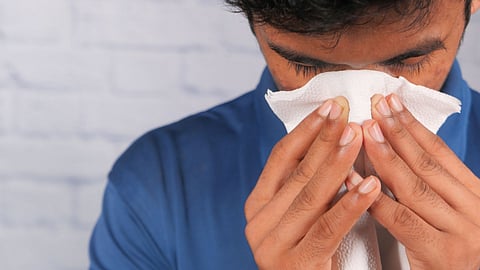

The Southern Philippines Medical Center (SPMC) encourages Dabawenyos to wear masks in connection with Mycoplasma Pneumonia which has affected some Filipinos recently.
Dr. Hakan L. Oztemiz, Level II resident of the Department of Internal Medicine at SPMC, said during the Kapehan sa Dabaw at SM Ecoland, Davao City, on Monday morning, December 18, that it is prudent to wear masks since there is still a pandemic and that Mycoplasma Pneumonia or Walking Pneumonia can be spread through droplets.
“Facemask helps kay diba droplet yung pag cough, sneeze, ma-block niya to some extent so less ang spread niya pero sa ngayon we still have Covid naman, we still have patients with Covid. I guess it will be prudent, it will kill two birds with one stone (Facemask helps because when you cough, sneeze, or whatever there will be droplets, [but wearing a mask] can block it to some extent so the spread is less, but right now we still have Covid, we still have patients with Covid. I guess it will be prudent, it will kill two birds with one stone),” Oztemiz said.
He shared that most of those with comorbidities such as asthma and people with underdeveloped immune systems are the ones who are likely to develop severe Mycoplasma Pneumonia.
The elderly ages 60 and above and children ages 18 and below are susceptible to Mycoplasma Pneumonia since most of their immune systems are weak.
“Should we be scared? Of course all diseases ay may risk naman diba with Mycoplasma Pneumonia though mild ito, may potential naman din maging severe usually sa mga patients na may comorbidities (Should we be scared? Of course, all diseases have risks with Mycoplasma Pneumonia though it is mild, it still has the potential to be severe usually to patients with comorbidities),” Oztemiz said.
The mode of transmission of Mycoplasma Pneumonia is similar to flu which is through droplets in coughing and sneezing hence, most people get infected in densely populated areas.
Oztemiz said that this is the reason why it is more prevalent in students who stay in classrooms with their classmates for a long period. This also raised concerns among parents since we recently had the Covid-19 pandemic.
He, however, revealed that the record rate of Mycoplasma Pneumonia in SPMC is low.
Its difference from typical pneumonia is that the patient who is infected with Mycoplasma Pneumonia does not know that he or she has already contracted it because it has flu-like symptoms while pneumonia has a high risk of becoming severe.
SPMC advises those who are experiencing fever, cough, runny nose, and sore throat that is still uncured after one week, to visit the nearest medical facility and get checked since Mycoplasma Pneumonia takes about two to three weeks to cure.
For people experiencing this type of symptoms, Oztemiz encourages them to avoid going to crowded areas to avoid spreading it and stay hydrated.
He expressed that Mycoplasma Pneumonia will be cured eventually with time but there are antibiotic medicines that doctors will prescribe to the patient if they want to get well easily. There are no vaccines for Mycoplasma Pneumonia and that SPMC highly discourages self-medication using antibiotics since this type of Pneumonia has a different type of bacteria that may be cured with a typical antibiotic.
He also assured that there is no increase in the number of typical Pneumonia patients in SPMC but they are still anticipating it because of the changing weather condition in the city. RGP